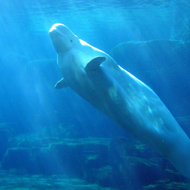Cat parasite found in Arctic Beluga whales

Beluga whale.
For the first time, US scientists have detected the cat parasite Toxoplasma gondii in western Arctic Beluga, prompting health warnings to Inuit people who eat whale meat.
The same research team from the University of British Columbia (UBC) also identified a new strain of the parasite, which was responsible for killing 406 grey seals in the north Atlantic in 2012.
Stephen Raverty from the UBC's Marine Mammal Research Unit has led the sampling and screening of hunter-harvested Beluga for the past 14 years.
He said: "Belugas are not only an integral part of Inuit culture and folklore, but also a major staple of the traditional diet. Hunters and community members are very concerned about food safety and security."
Speaking at the annual meeting of the American Association for the Advancement of Science (AAAS), UBC researchers explained that the "big thaw" occurring in the Arctic is allowing pathogens to spread to new marine and land animals.
"Ice is a major eco-barrier for pathogens," said Michael Grigg from the university's Marine Mammal Research Unit. "What we’re seeing with the big thaw is the liberation of pathogens gaining access to vulnerable new hosts and wreaking havoc."
Grigg also identified a new strain of Sarcocystis as the cause of the 2012 seal deaths. The parasite was named Sarcocystis pinnipedi at the recent AAAS meeting. While not harmful to humans it has also caused the deaths of an endangered Steller sea lion, Hawaiian monk seals, walruses, and polar and grizzly bears.
The main cause of Toxoplasma spread is the consuming of undercooked meat or water that has been in contact with soil contaminated by cat faeces.
While a third of the world's population is thought to carry toxoplasma, it is not a major concern for healthy individuals. It presents a threat, however, to pregnant women and those with immune deficiencies.
According to UBC, all four women in a northern Quebec village who were exposed to Toxoplasma during pregnancy in 1987 gave birth to congenitally infected children.
Toxoplasma in marine mammals has been previously identified by UBC researchers, but finding the parasite in hunter-harvested Beluga raises public health concerns.
Grigg said: "The Inuit’s traditional processing and cooking methods should be enough to kill Toxoplasma, but vulnerable populations like pregnant women need to be extra vigilant around handling and consuming raw whale meat."



 The Greyhound Board of Great Britain has published new vaccination guidance, with all greyhounds registered from 1 January, 2027 required to have the L4 leptospirosis vaccination, rather than L2.
The Greyhound Board of Great Britain has published new vaccination guidance, with all greyhounds registered from 1 January, 2027 required to have the L4 leptospirosis vaccination, rather than L2.